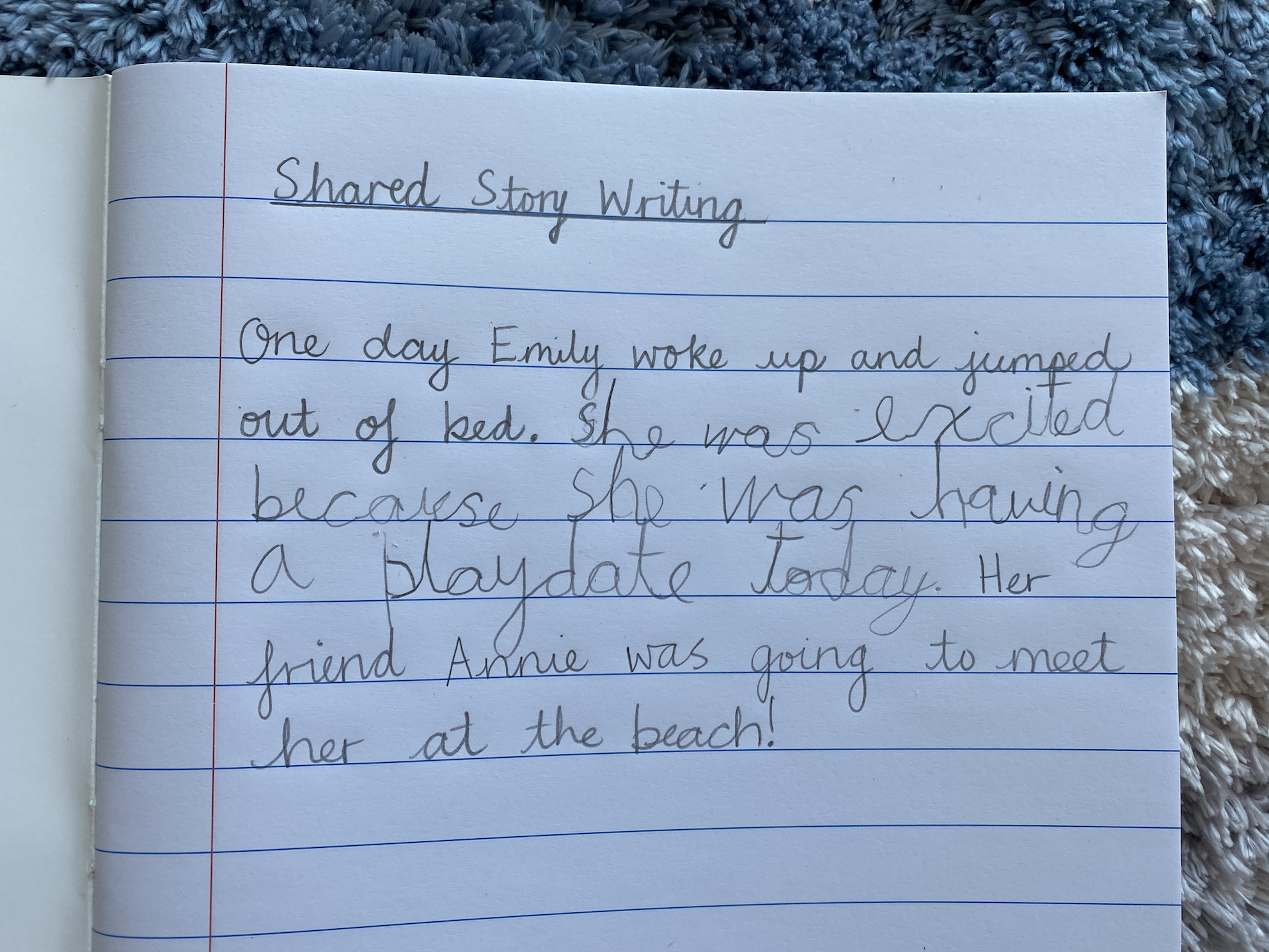Encouraging Story Writing in the Early Years
It is never too early to encourage the appreciation of stories, imagination and creativity. By encouraging story writing in the early years, children begin to harness and express their ideas in writing at a young age and will be able to excel at English in later years. Most importantly, young children need the confidence to “have a go” at writing their ideas without fear of making mistakes or being judged about their abilities.
The government’s guidance for Early Years practitioners recognises the importance of the appreciation of literature and encouraging story writing in the early years. “Practitioners have a crucial role to play in finding ways of engaging and collaborating with children in writing, of creating interesting and purposeful opportunities to write both indoors and outdoors and planning higher levels of adult-child interaction that support children’s thinking.” By creating opportunities for writing and encouraging a risk-taking attitude towards writing, early years teachers can create a high-quality literary environment. This of course, is the same in the home environment. Parents can help by encouraging story writing in many different ways.
Even at a young age, children need to be introduced to the concepts of writing in simple terms. A writer of any ages needs to:
- Understand the reason for writing – to inform, to explain, to entertain
- Understand the audience for their writing – parents, friends, teachers, book characters
- Be able to gather ideas for their writing through brainstorming methods
- Use imagination for ideas and previous knowledge for vocabulary
Encourage Story Writing in the Early Years
Inspiring students to write in the early years can sometimes be challenging so it is important to provide them the appropriate tools necessary to utilise their imaginations.
1. Role Play Areas
Of course, role play is always an important part of any early years play area, whether at home or in the classroom. A setting such as a post office, supermarket or doctor’s office is a perfect way to encourage writing for purpose. Give a directed task to accompany any role play areas so that children can “have a go” in a non-threatening environment. Writing grocery lists, letters or instructions can provide the opportunity to experiment with language. Provide prompts and key vocabulary that they can use in their writing. Display completed writing tasks in the role play area without corrections.
2. Story Bags

Encourage creative thinking with key props which can be used to form the plot of a story. Theme bags can be useful in getting children to use their imaginations to form a story based on related items. A jungle theme story bag would include a map, a magnifying glass, bug spray and a sun hat. Discuss the items, what would they be used for? Why would someone need them? Where are they going? Why could they be going there? What do they find? Key questioning is imperative to get children started with their story writing. Write key vocabulary for them to access and encourage different problems and solutions. They can express their ideas using a mixture of illustrations and writing.
3. Shared Story Writing
 Writing a full story can be a daunting prospect for a young child so make it a collaborative task. Shared story writing can be done as a class, in small groups or in pairs. As a class, include a number of characters and settings which can be chosen to kick start the story. Each child participates by adding a sentence to the story. As a class, tell the story orally, encouraging each student to add to the story as it works towards a climax, resolution and conclusion. If working in small groups or pairs, then the work can be oral as well as written, taking turns writing sentences to build the story. This collaborative work can be really enjoyable for students who may be reluctant to write independently.
Writing a full story can be a daunting prospect for a young child so make it a collaborative task. Shared story writing can be done as a class, in small groups or in pairs. As a class, include a number of characters and settings which can be chosen to kick start the story. Each child participates by adding a sentence to the story. As a class, tell the story orally, encouraging each student to add to the story as it works towards a climax, resolution and conclusion. If working in small groups or pairs, then the work can be oral as well as written, taking turns writing sentences to build the story. This collaborative work can be really enjoyable for students who may be reluctant to write independently.
Encouraging Story Writing at Home
When considering how children can participate in story writing, we first have to encourage children’s expressive skills, specifically how they can structure sentences and their abilities to express their ideas fluently. To create stories, children must draw upon a rich store of words, expressions and different types of language. These skills are created when children are listened to and also take part in conversations regularly with adults as they build up a range of language choices. This language can then be drawn upon as children begin to engage in the processes of writing.
Celebrate Story Writing in the Early Years!
There are many things you can do at home to help encourage your child to write. The most important factor is to read to them as much as possible. By feeding them with vocabulary and story ideas, they will have a bank of knowledge from which to draw upon when it is their turn to write. It’s also important to let your child see you writing and involve them in it. For example, you could sit down together and write a birthday card for Grandma or a message for Daddy. Young children love to copy behaviour and they will want to pretend to write if they see adults doing the same. Try and encourage a purpose for writing so that children are motivated to engage. For example, after a holiday you can create a scrapbook with photos and captions to show their grandparent or family member.
When it comes to fictional story writing, try to work together to come up with ideas and model the process of planning. If you work together, children will gain experience with the process and will feel more confident to do it independently as they get older. Shared story writing means taking turns writing sentences to build your story. This collaborative form of writing is less intimidating for children. Most importantly, try not to correct every mistake they make. If you can’t read a word, ask them to read it to you. If it is a word that they should be spelling correctly at their age, you can model the correct spelling. If it is a higher-level word, then praise them for being adventurous and trying their best to use tricky words – correction isn’t necessary. Praise their efforts to encourage resilience.
Top Tips for Story Writing at Home
- Read stories together as much as possible.
- Model writing tasks for various reasons, such as letters to relatives, or notes to family members.
- Give purpose to their writing by creating projects such as scrapbooks with captions and information about holidays or diary writing.
- Encouraging story writing in the early years is done by discussing ideas and helping them to write it down. Shared story writing is a great option because you share the load with your child.
References:

